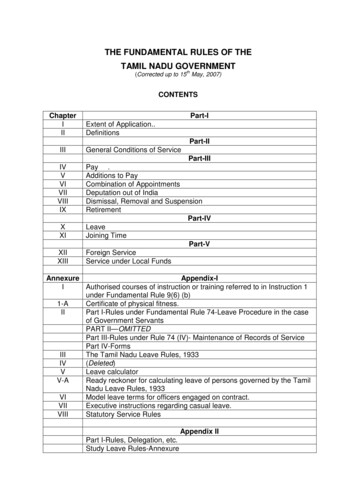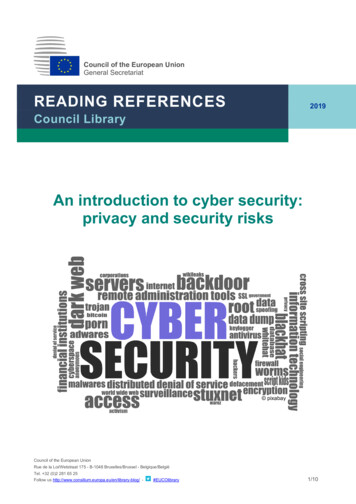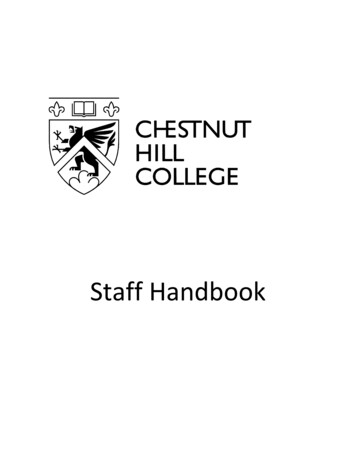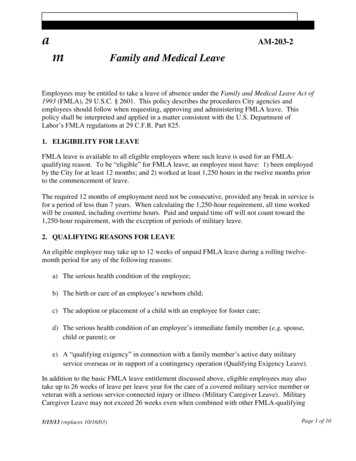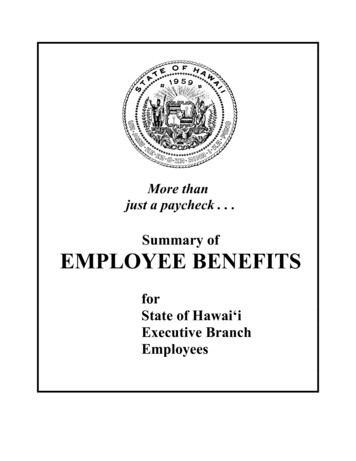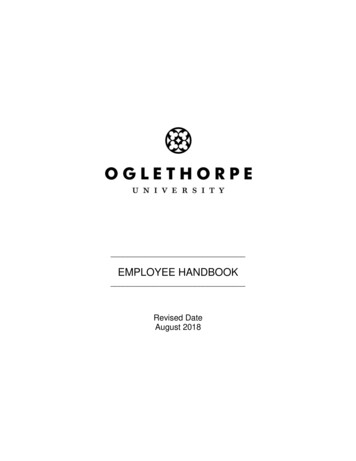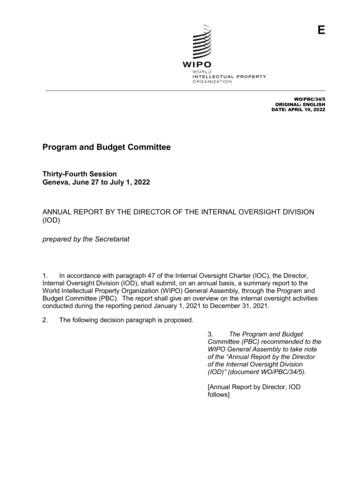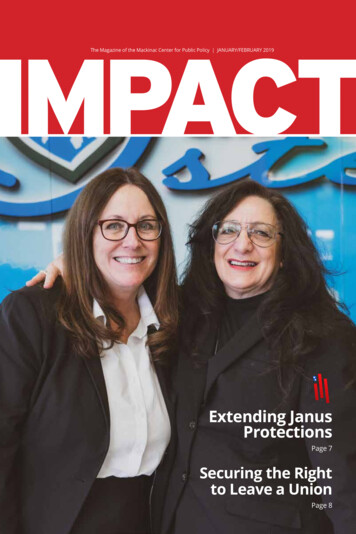
Transcription
The Magazine of the Mackinac Center for Public Policy JANUARY/FEBRUARY 2019Extending JanusProtectionsPage 7Securing the Rightto Leave a UnionPage 8
Explore this issueBLOGCAPCONKeep up-to-dateon the latest policystories from MackinacCenter analysts.Michigan CapitolConfidential is thenews site of theMackinac Centerthat provides uniquenews coverage.Mackinac.org/blogMICHIGANVOTESWant to know whatyour legislator(and others) havebeen voting for?MichiganVotes.org helps keepMichigan politiciansaccountable totheir come, Gov. WhitmerMedia Roundup for 2018515Year in Preview: Criminal JusticeSupporting the FreedomMovement is Nothing Shortof HeroicDATABASESLabor contracts,superintendentsalaries, schoolgrading and more.Our online databasesprovide easyaccess to ing Janus ProtectionsListen to the People8Securing the Right to Leavea Union9“Efforts to reformforfeiture laws havebrought togetherdisparate groups fromopposite sides of thepolitical spectrum,including the left-leaningAmerican Civil LibertiesUnion of Michiganand the free-marketMackinac Center forPublic Policy.”— From a Detroit News article written byJonathan Oosting and Beth LeBlanc, on newdevelopments in reforming forfeiture lawsin Michigan.17Public lands policy must take theviews of residents into account18Legislative BriefingIntroduces New Legislatorsto Mackinac CenterNew Policymakers Mean MoreScrutiny of Recent Policy Changes1910Mackinac Center OpensLansing OfficeState Enacts Report CardRequirement for Schools1911By The NumbersPolicy VictoriesThe Lame Duck is Cooked.How Does it Taste?2013A Chronicle of CronyismNew study tracks Michigan’slong-standing prohibition againstcorporate handoutsMonthly Giving a Win-Win
Our website has been completely overhauled! The homepage has a new, easy-to-uselayout, navigation has been streamlined, and text size has been increased throughoutthe site to make everything easier to read. The website has also been optimized formobile devices so you can enjoy the same great experience on the road.Check it out and let us know what you think!MACKINAC.ORG
Board of DirectorsLETTER FROM THE PRESIDENTHon. Clifford W. Taylor,ChairmanRetired Chief Justice,Michigan Supreme CourtWelcome, Gov. WhitmerNovember’s elections signaled the abrupt endgovernment affairs operation?” We jottedof eight years of unified Republican control ofdown the following traits that make usMichigan government. Democrats replaceddifferent from lobbyists who swarm theRepublicans in all four of thehighest statewide constitutionaloffices.RepublicansheldtheJOSEPH G.LEHMANHouse and Senate but lost seatsCapitoltorepresentpoliticalorganizations, trade associations,interestgroupsandsingle-issue concerns.in both. Michigan’s Supreme Court, whichwas already moving away from conservativejurisprudence, became more liberal afterthe elections. Now that Democrat Gov.The Mackinac Center will: market public policies.Gretchen Whitmer succeeds the GOP’sRick Snyder, how will the Mackinac Center transformational free-market ideas like lower through choice and flexibility, sensibleregulation, and labor freedom.We’ll remain nonpartisan, working with with our policy recommendations. Evenwith Republicans in total control, we found curtailing civil asset forfeiture, where lawenforcement agencies seize property duringa criminal investigation but then retain it forfinancial gain. Thomas BertonneauSUNY - OswegoBrad BirzerHillsdale CollegePeter BoettkeGeorge MasonUniversityTheodore BolemaThe Free StateFoundationGlenn MootsNorthwood UniversityGeorge Nastas IIIMarketing ConsultantsTodd NesbitBall State UniversityJohn PaffordNorthwood University(ret.)Mark PerryUniversity of Michigan- FlintShikha DalmiaReason FoundationHoward SchwartzOakland Universityof perfection.Chris DouglasUniversity of Michigan- FlintMartha SegerFederal Reserve Board(ret.)Conduct ourselves with professionalJefferson EdgensUniversity of WyomingJames SheehanSunTrust RobinsonHumphreyDemonstrate that our policy ideasBe respectful but never obsequious.I’m sad to report that these seven practicesare just about all that’s necessary to stand outWe will model civility. We leave thethat none of these are new to us, so we won’tmudslinging, name-calling, innuendo, andfind it difficult to harness the power of thesethose things.Donald AlexanderWestern MichiganUniversitywhen political compromise falls shortin a very good way. But I’m happy to reportcharacter attacks to those who seem to enjoyBoard of ScholarsSteve SafranekPrivate SectorGeneral Counseland human flourishing.with the ACLU, for example, to work towardKent B. HerrickPresident and CEO,ThermogyD. Joseph OlsonRetired Senior VicePresident and GeneralCounsel, AmerisureCompaniesDan CraneUniversity of MichiganLaw SchoolAlways articulate the ideal policy, buta healthy society, respect for the people,lawmakers and organizations. We joinedRichard G. HaworthChairman Emeritus,Haworth, Inc.Richard D. McLellanAttorney, McLellan LawOfficesGregory RehmkeEconomic Thinking/E Pluribus Unum Filmsproduce superior outcomes that fosterit beneficial at times to partner with liberalDaniel J. GrafChief Investment Officer,Amerisure MutualHoldings, Inc.Joseph P. MaguirePresident,Wolverine DevelopmentCorporationMatt CoffeyCentral MichiganUniversitycourtesy.anyone, regardless of party, who agreesDulce M. FullerOwner, Woodward andMapleRodney M. Lockwood Jr.President, LockwoodConstruction Company,Inc.Lawrence W. ReedFoundation forEconomic Educationdon’t impede progress toward the idealtaxes and spending, educational excellenceJim BarrettRetired President &CEO, Michigan Chamberof CommerceEdward C. Levy Jr.President, Edw. C.Levy Co.Michael ClarkHillsdale CollegeSpeak out only where and when wehave research and expertise.We’ll start by continuing practices that haveproved effective. We’ll stay on offense forPresent only information that is accurateand measured.advance free-market ideas in the newpolitical environment?Be predictable advocates for free-Joseph G. Lehman, PresidentMackinac Center forPublic PolicyJ.C. HuizengaPresident, WestwaterGroupRoss EmmettArizona State UniversitySarah EstelleHope CollegeHugo EyzaguirreNorthern MichiganUniversityTawni FerrariniNorthern MichiganUniversityBurton FolsomHillsdale College (ret.)John GretherNorthwood UniversityDavid HebertAquinas CollegeMichael HicksBall State UniversityOrmand HookMecosta-Osceola ISDHarry HutchisonGeorge MasonUniversity School of Lawtraits to advance free-market policies.David JandaInstitute for PreventativeSports MedicineGov. Snyder left Michigan in better shapeAnnette KirkRussell Kirk CenterRev. Robert SiricoActon InstituteBradley SmithCapital University LawSchoolChris SurprenantUniversity of NewOrleansJason TaylorCentral MichiganUniversityJohn TaylorWayne State UniversityRichard K. VedderOhio UniversityHarry Veryser Jr.University of DetroitMercyJohn Walter Jr.Dow CorningCorporation (ret.)Mike WintherInstitute for PrincipleStudiesGary WolframHillsdale CollegeWe’re ready to add new capabilities as well,than it was when he assumed office. Butincluding a more muscular governmentstill, billions of tax dollars are misspent andaffairs presence in Lansing. David Guenthner,government harasses and even harms theour new senior strategist for state affairs, willpeople through poor policy.Charles MeiserLake SuperiorState University (ret.)Gov. Whitmer, and everyone else in Lansing,140 West Main Street, P.O. Box 568lead this crucial capacity to ensure effectiveeducational outreach to lawmakers andstrong relationships with them.can count on the Mackinac Center toenergetically advocate for the policies weOver barbecue, I asked David, “Whatbelieve have proved to help people the mostdistinguishesand to live by the principles outlined here. IMPACTtheMackinac4 January/February 2019Center’smackinac.orgDavid LittmannMackinac Center forPublic PolicyDale MatcheckNorthwood UniversityMidland, Michigan 48640989-631-0900, Fax 989-631-0964www.mackinac.org mcpp@mackinac.orgIMPACT is published six times a year by the Mackinac Centerfor Public Policy, a nonprofit, nonpartisan, tax-exemptresearch and educational institute classified under section501(c)(3) of the IRS code.JOHN LAPLANTE EditorILIA ANDERSON Designer
CRIMINAL JUSTICEYear in Preview: Criminal Justice2019 ushers in a highly anticipatedand corrections policies. In this area,the poor are disproportionately burdenedchange in the state political environment.more than many others, policy changesby processes meant to serve all peopleThe election of a Democratic governor,can save and redeem lives.equally. We will continue to condemnlieutenant governor, attorney general andsecretary of state alongside amajority-Republican Legislaturewill divide the branches ofEmpowering judges to get toKAHRYNRILEYgovernment for the first time innearly a decade. Happily, however, there isone issue where consensus should be easyto reach: Michigan’s continuing need forsmart criminal justice reform.The state made several great strides onthis issue under Republican leadership,drawing national attention and developinga new reputation as an innovativeleader in corrections and re-entry. Now,Republicans may be tempted to halt thatprogress to prevent a Democratic governorfrom receiving credit for successfullyimplementing additional reforms — butthey should resist. As some of Michigan’sthe root causes of crime byusing specialty drug, sobrietyand mental health courts helpsstop the cycle of offending andre-offending, for instance. Providinggovernment overreach. We will continueto call for more transparency about howmoney flows in the justice system andfor better accountability for our courtand corrections officials, so they will rulejustly and rehabilitate effectively.prisoners opportunities to get diplomas,In the couple of years that the criminaldegrees and vocational certificationsjustice department has been active, we’vereduces recidivism and helps employersstruck on an effective model to expandclose the talent gap. Getting more policethe Overton Window, and you’ll see itofficers out of patrol cars and onto footin action again in the new year. Look forpatrols helps them gain the trust of thenovel, peer-reviewed research, anothercommunities they serve and resolve casesroster of Issues & Ideas Forums onmore quickly. All of these advances andpressing topics within the criminal justicemore have been made possible in the lastfield, and a steady supply of commentary,few years by a wealth of reliable data andop-eds, media interviews and coalition-the willingness to act on it with anyonebuilding. Our robust, influential networkwho wants to help. It would be tragic toof partners has become one of thelet politics get in the way now.hallmarks of this initiative, and we hope itserves as a model for all Michiganders tomost prominent business leaders haveFor our part, the Mackinac Center willrepeatedly argued and demonstrated bycontinue taking a balanced, data-drivenexample, our state’s families, workforceperspective on the policy choices that willand neighborhoods stand to make realmake us freer, safer and more prosperous.Kahryn Riley is the director of criminal justicegains when we reform our courts, policeWe will continue identifying areas wherereform at the Mackinac Center.reach across the aisle and do the work ofmaking our state a better place. IMPACT 5January/February 2019mackinac.org
Susan Marshall (left) and Linda Rizzo-Rupon (right) are two of theplaintiffs represented by the Mackinac Center Legal Foundation.IMPACT6 January/February 2019mackinac.org
The Mackinac Center Legal Foundation fights for the rights and freedoms of individuals inMichigan and around the country so that workers can freely and happily prosper. As part ofthis effort, it is currently working on two important cases, both of which are outlined on thenext two pages.Extending Janus ProtectionsIn the wake of the great victory for workercourts to extend the logic of Janus to thefreedom provided by the Supreme Court’sRailway Labor Act.recent Janus decision, the Mackinac CenterLegal Foundation filed a lawsuit on Jan. 8,2019, in a federal district court in NewJersey. The case, of Machinists and AerospaceWorkers, is on behalf of threeUnited Airline ticket agents:Linda Rizzo-Rupon, Susan Marshall andNoemieo Oliveira. The collective bargainingagreement between their union — IAMDistrict 141 — and United Airlines requiresall workers to pay the union. Employees arefree to join the union, but those who do notmust render “a monthly sum equivalent to thestandard monthly dues required of the Unionmembers.” This sum, which the agreementcalls a service fee, can cost an employee over 700 a year. The three workers are asking thecourt to find that they have a constitutionalright to not be forced to pay unions as arequirement of employment.Far too often, workers, like Rizzo-Rupon, arebullied by unions. She says that when shestarted asking the union about her rights,it started bullying her into signing up andbecoming a member. Rizzo-Rupon feelsthat she has the necessary skills — as a goodemployee — to protect her own job. Whyshould she be forced to pay a fee to the union?There are approximately 500,000 airlineworkers and over 200,000 railway employeesin the United States, many of whom are likelycovered by a collective bargaining agreementand forced to pay agency fees to unions.Applying Janus to the Railway Labor Actwould extend worker freedom to a significantnumber of people across the country and givethem what they deserve — the right to have asay over their pay. Morgan Shields is the director of Workers forOpportunity at the Mackinac Center.Janus held that states and public sectorunions violate the First Amendment Rightsof public employees when they extract servicefees without their consent. Before states andpublic sector unions deduct agency fees fromnonmember’s wages, employees must firstaffirmatively consent to the deduction. Byfiling this suit on behalf of the three airlineworkers, the Foundation is asking for theIMPACT 7January/February 2019mackinac.org
Terence Gaudlip (left) andMichael Thulen (right)Securing the Right to Leave a UnionOn Oct. 3, 2018, the Mackinac CenterAnticipating this ruling, legislative allieswhere necessary. One major ally has beenLegal Foundation filed suit on behalf ofof New Jersey’s unions wasted no timeAmericans for Prosperity-New Jersey.trying to protect union financesTogether, we have sought to aid the over-by enacting the Workplace300,000 public sector workers affected byDemocracy Enhancement ActJanus in the Garden State.three Lakewood, New Jersey, cityemployees who seek the rightto end their financial obligationPATRICKWRIGHTto a public sector union at anyon May 18, 2018. In part, thistime. Michael Thulen, Michael Porter,law limits to 10 days a year the time whenand Terence Gaudlip sued AFSMCE andpublic employees could end financialvarious New Jersey state officials so as tosupport to a union. It is meant to makeoverturn a provision in a law the union’sit harder for current union members toallies in New Jersey passed to limit thebecome nonmembers and therefore clearlyimpact of the Supreme Court’s Janus v.be protected by the Janus decision.AFSCME decision.Thulen is a former union leader for his local,and when this case was filed, he said “Assomeone who has personally committedmy time and energy to stewarding my localunion, I fully believe that unions can playa positive role in the workplace. We aresimply asking that our labor leaders spendThis case arose, in part, due to themore time serving their members in thatIn that case, the Supreme Court held thatMackinac Center’s campaign, My Pay Mycapacity rather than erecting arbitrarypublic sector employees did not haveSay, and its work in New Jersey. Havingbarriers meant to hold us hostage.”to provide financial support to unionslearned many lessons in union tacticsthat the employees were not memberswhen Michigan went right-to-work in lateof. Nationally, there are 5 million public2012, the Mackinac Center has sought tosector employees directly affected by thisassist other states in informing their publicdecision, which could eventually cost publicsector workers of their rights under Janussector unions over 600 million annually.and protecting those same rights in courtIMPACT8 January/February 2019mackinac.orgThe case was assigned to the federal districtcourt in Camden, New Jersey. Patrick Wright is the vice president for legal affairsat the Mackinac Center.
New Policymakers Mean MoreScrutiny of Recent Policy ChangesDuringincomingDeciding on the right vendor can getGov. Gretchen Whitmer pledged to fix thecomplicated, but politics complicates itroads in the state. She also pushed backeven more. Politicians don’t just wanton some of the major reforms of the pastbuildings to be built, they want other socialfew years. She wants people toends to be served in their construction.be fired if their workplace isThey may want only environmentallyunionized and they choose notfriendly buildings to be built, for instance.JAMESHOHMANthecampaign,to contribute to the union. Inother words, to repeal right-to-work. Shewants to increase the costs of governmentconstruction projects. In other words,to reinstate the prevailing wage laws.But these are good reforms that help thepeople in the state and deserve to remain.The Mackinac Center made a strong effortto educate lawmakers about the benefitsof both reforms. But they will only remainif people want them to be around, so we’llPrevailing wage policies are like that. Theyrequire union-scale wages for individualswho work on government constructionprojects: We don’t want to build buildings,we want to build buildings with unionlabor. This is good for union constructionworkers and bad for taxpayers.So prevailing wage laws transfer wealthfrom the public to those working ongovernment construction projects. Theget a chance to see how popular they are.public doesn’t get anything in returnBoth laws ensure that unions are voluntarywealth and getting rid of it will stretchinstitutions. Right-to-work allows peopleto opt out of an organization that theydon’t want to support. Prevailing wagerequirements weight the bidding forgovernment construction projects tounion vendors, which prevents publicservants from giving the public thebest deal.Right-to-work changes how unions treattheir members. If unions can take theirmembers’ financial support for granted,they are less likely to act in their members’best interest. The fact that unions couldhave taken members’ financial supportfor granted may have explained why theyfor that generosity. It’s a bold transfer oftaxpayer dollars further. The savings willbecome more obvious as the economyexpands and state and local governmentsconstruct more things.Laws, such as ones on union membershipor the prevailing wage, can concentratebenefits to some groups at the public’sexpense. This happens all around thecountry. One of the Mackinac Center’simportant functions is to help lawmakersget rid of these kind of laws. And wedo this by fostering a climate of publicopinion that makes it unpopular toprovide private benefits at public expense.have tended to be ideological and partisanSo when new policymakers are elected,in ways that their members are not. Awe get a test of popular sentiment. Newchange to unions’ incentives encouragespublic officials have likes and dislikesthem to represent their members andthat differ from those of the peopleto work with employers for mutual gain.they replace. Yet they are still electedThis can have economic impacts on therepresentatives of the state’s residents andwhole state and help right-to-work statesare ultimately subject to what they want.have faster growth in population, incomePolicy changes only last as long as they areand employment.Regarding prevailing wages, the publicpopular. We’re going to see how good of ajob we’ve done. benefits most when government contractsJames Hohman is the director of fiscal policy atgo to the best vendor with the best price.the Mackinac Center.IMPACT 9January/February 2019mackinac.org
LAME DUCKState Enacts Report CardRequirement for SchoolsThanks to recent action from Lansing,to peers of similar economic backgrounds,Even though the state's assessmentspublic schools in Michigan finally areamong other things.certainly cannot provide a completeabout to receive the same sort ofreport cards as their students.BENDEGROWWhile far from a panacea forthestate'seducationalills,Up to now, Michigan has usedan assortment of tools to reportschool performance, includinghard-to-decipherdesignationspicture of school quality, many parentsstill know they tell something valuable.That's especially true of lower-incomeand minority parents. Most surveyed saidthat standardized test scores played anthe passage of House Bill 5526 is aand color-coded scorecards. The interesthope-filled victory worth celebrating.groups that dominate education debatesAssigning schools letter grades based onat the Capitol have been served byperformance is a popular, commonsensea murky accountability system thatIt's hard to say how much schoolidea that benefits parents who haveconfuses more than clarifies. They’re alsoletteratremendousamountinvestedinextremely important role in helping themdecide where to enroll their child.gradeswilldrivelarge-scalebetter organized than parents who wantimprovements. Research from Floridathose results.an easily understood measuring tool.and New York City found that the fear ofSerious legislative efforts to bring schoolA March 2018 poll commissioned by theletter grades to Michigan extend backMichigan Association of Public Schoolat least five years, well before the high-Academies, representing the state's charterpressure partisan turmoil of December’sschools, found statewide voter supportWe can only wait to see if similarlame-duck session. But the pressure of thefor an A-F school grading system dwarfedimprovements play out in Michigan. Butticking clock at the end of the year helpedopposition by 69 to 22 percent. Nearlygiving parents more and better tools tothe bill's outgoing champions — Gov. Rick50 percent strongly agreed with the idea.help them decide their children's path toSnyder and Rep. Tim Kelly, R-SaginawTownship — get it across the finish line.Their instincts are justified. An easier-tograsp system of letter grades brings moreearning an F grade led schools to makereal classroom changes that broughtabout measurable improvements.educational success? That deserves ourapplause, right now.In adopting HB 5526, Michigan joinsparents into the conversation about howChampions of educational freedom and15 other states that use letter grades toto improve schools. It also provides usefulexcellence should count this legislation asmeasure public school performance.information for parents who choose aa small but undeniable triumph. Unlike the other states, though, it will notschool other than the one assigned to themassign schools an overall grade. Instead,based on their address. Fifteen percent ofschools will get five separate grades,1,500 Michigan charter school parentseach based on how many students meetrecently surveyed by the Mackinac Centeracademic standards, improve in theirsaid they had difficulty finding usefultested knowledge, and achieve comparedinformation about school quality.IMPACT10 January/February 2019mackinac.orgBen DeGrow is the director of education policyat the Mackinac Center.
LAME DUCKThe Lame Duck is Cooked.How Does it Taste?Michigan’s recently concluded lame-duck session was consequential both in the number of bills theLegislature passed (more than 400) and the number of those bills Gov. Rick Snyder vetoed (60). Here isa quick rundown on some of the key issues where the Mackinac Center provided its expertise:Voter-Initiated LegislationLabor ReformThe Legislature and governor approved essential revisionsA bill that would have required public sector unions toto the unworkable and economically damaging legislationconduct regular recertification elections passed out ofon paid sick leave and the state minimum wage.committee but was not brought to the Senate floor for avote. Several term-limited senators who had heretoforebeen reliable supporters of labor reform were uninterestedA-F Accountabilityin additional measures to empower Michigan publicsector workers.Gov. Rick Snyder signed legislation to require theMichigan Department of Education to issue every schoolin the state an A-F grade on five criteria related to studentacademic performance.Licensure ReformThe Mackinac Center’s licensure reform package, whichpassed the House 106-1 in October, was gutted in a SenateEnvironmental RegulationA bill to prohibit state environmental regulations stricterthan those imposed by the federal government was signedcommittee by a term-limited senator at the behest of severalLansing trade associations. It later died without receiving avote on the Senate floor. We will redouble our efforts on thispackage in 2019.into law.Legislature InterventionNonprofit Supporter ProtectionsA bill that would have prohibited state and local governmentsfrom compelling 501(c) nonprofit organizations to producelists of donors or members passed both chambers but wasvetoed by Gov. Snyder for specious reasons.Gov. Snyder also vetoed a bill that would have guaranteedthe Legislature’s standing to intervene in any lawsuitchallenging the constitutionality of a Michigan law. Theveto came back to bite him almost immediately, as oneof his successor’s first acts as governor was to request anattorney general’s opinion on the constitutionality of theLine 5 tunnel legislation Gov. Snyder championed. Both ournew governor and attorney general campaigned on shuttingdown that pipeline.While we are all frustrated that more of these priorities did not become law in 2018, the valuable lessonswe learned will influence our legislative engagement and strategy going forward. IMPACT 11January/February 2019mackinac.org
This study is available online at mackinac.org/s2018-12.IMPACT12 January/February 2019mackinac.org
A Chronicle of CronyismNew study tracks Michigan’s long-standingprohibition against corporate handoutsPoliticians today freely give away massiveeven if that spending produces tangentialhandouts. Wright also shows that even thesubsidies to select companies if theybenefits for the public.authors of the state’s current constitutionpromise to relocate or create new jobsin their state or city. Whether it’s the 4 billion Michigan officials supposedlyoffered Amazon to locate its secondheadquarters here or the 4 billionWisconsin pledged to Foxconn, thesestories are commonplace today. This iswhy most people probably don’t knowthat for much of Michigan’s history,corporate handouts like these werestrictly al History of Corporate Handoutsin Michigan” is a new study by theMackinac Center’s Patrick Wright, vicepresident for legal affairs, that chroniclesMichigan’s early history with taxpayerfunded economic development. A keyactor in this story is one of Michigan’sfinest Supreme Court chief justices,Thomas Cooley. In a landmark SupremeCourt case in 1870, Justice Cooley laid outthe rationale for why taxpayers’ moneyshould not be spent for private purposes,Justice Cooley wrote in that opinion:meant to prohibit them.“Every honest employment is honorable,In 1941, the Michigan Supreme Courtit is beneficial to the public; it deservesthrew out Justice Cooley’s precedent andencouragement. . But it is not the businessapproved subsidies for apple growers.of the State to make discriminations inSurprisingly, the court’s opinion restedfavor of one class against another, or inmerely on the argument that subsidizingfavor of one employment against another.apples would have a positive spinoff effect;The State can have no favorites. Itsit failed to address the principal objectionbusiness is to protect the industry of all,to this use of taxpayer dollars that Justiceand to give all the benefit of equal laws.”Cooley had articulated.This legal precedent established by JusticeBased on the findings of this new study,Cooley was repeatedly challenged inWright argues that the courts should takethe courts for decades. Lawmakers keptanother look at the constitutionality oftrying to fund special interest groups, buttaxpayer-funded economic developmentthe Michigan Supreme Court again andprograms. There does not appear toagain used the Cooley precedent to denybe a strong legal case for why thiscorporate handouts to the likes of railroadspending should be legal now, givencompanies, sugar manufacturers, cornthat it was prohibited for much offarmers and streetcar companies.Michigan’s history. In addition, Michigan voters repeatedlyreaffirmed this constitutional prohibitionby rejecting multiple attempts to amendthe state constitution to allow corporateIMPACT 13January/February 2019mackinac.org
Media Roundup for 2018In 2018, the Mackinac Center reached morewas mentioned in multiple editorials byaudiences than ever before. Our researchThe Detroit News.and expertise was quoted in over a hundreddifferent news outlets and our policyexperts had a direct voice through op-eds,which appeared in many outlets across thenation and throughout Michigan.Every victory, big or small, is importantto our mission. But perhaps the mostinfluential of last year was the U.S. SupremeCourt decision known as Janus v. AFSCME.Communications CoordinatorNot only was our amicus brief cited in thedecision, but we also gained nationwidemedia attention through our expertisein labor issues and our new nationwidecampaign, My Pay My Say.In the wake of the decision, the country’stop newspapers turned to the MackinacCenter for commentary, including TheNew York Times, The Wall Street Journal,The Washington Post and Politico. Jo
Hillsdale College Peter Boettke George Mason University Theodore Bolema The Free State Foundation Michael Clark Hillsdale College Matt Coffey Central Michigan University . degrees and vocational certifications reduces recidivism and helps employers close the talent gap. Getting more police




